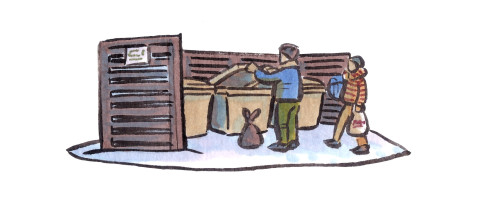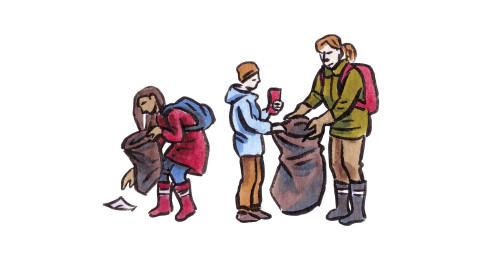Led by the University of Eastern Finland, the WasteLess Karelias project concluded that a sense of community, active communication and resident participation play key roles in the development of local waste management, recycling, and sorting practices. An international jury has shortlisted WasteLess Karelias as a finalist for the 2022 Arctic Award presented to the European Union’s Arctic Cooperation Programmes. The winner will be selected from among three finalists based on online public voting which is open until 25 January 2023.
WasteLess Karelias developed and studied waste management in collaboration with local residents, authorities and companies in North Karelia (Finland) and the Karelian Republic (Russia) for 3.5 years. However, following Russia’s invasion of Ukraine, all collaboration relating to projects and research was frozen. The findings of the project have been published as The WasteLess Storymap.
In Finland, the villages participating in the WasteLess Karelias project were Mekrijärvi in Ilomantsi and Timanttikylät in Juuka, and the Russian villages participating were Vieljärvi, Naistenjärvi and Tolvuja. The impact of the measures taken in the villages of North Karelia was measured by surveys carried out at the beginning and end of the project. The results showed that the share of households recycling waste increased from 89% to 94%, and the amount of mixed waste decreased.
“During the project, a great deal of effort to develop waste management was also made in the Karelian Republic, and for example sorting stations were installed in the participating villages. The freezing of collaboration put an end not only to the promising steps taken to improve waste management, but also to research. After Russia’s invasion of Ukraine, we decided to shift part of the project’s capacities to Ukrainian refugees in and around Joensuu and organised various waste and environmental related events for them,” Assistant Professor Moritz Albrecht, Coordinator of the WasteLess Karelias project, says.

Increased environmental awareness and interest in recycling
In the villages of North Karelia, the recycling of plastic increased significantly. At the start of the project, 43% of households disposed of plastic as mixed waste, compared to only 24% at the end of the project. At the end of the project, cardboard and paper were no longer disposed of as mixed waste.
The availability and accessibility of recycling stations improved both in Mekrijärvi and in Timanttikylät. Residents also estimated that the condition of the recycling stations improved towards the end of the project.
“According to a survey we carried out in the project, village residents’ environmental awareness and interest in recycling increased. A growing number of people feel that the amount of waste can be reduced.”
WasteLess Karelias examined the local waste situation in the villages as well as residents’ ideas and possibilities for reducing and recycling waste. Workshops on waste management and various clean-up campaigns were organised in the villages of North Karelia, and collaboration with local residents was close.
Environmental education and trash art
Another important role was played by collaboration with schools, which aimed, among other things, to increase pupils’ awareness of waste and recycling, and to develop concrete ways to work for the environment.
Workshops organised in schools consisted of teaching sessions related to waste and sorting, trash art workshops, and clean-up campaigns carried out near the schools. Sorting bins were also introduced to schools in the Karelian Republic in Russia so that pupils could continue putting things learnt in the workshops to practice in the everyday life of their school. Teachers involved in the WasteLess School actions felt that workshops cutting across several subjects were successful. The Association for Rural Culture and Education was closely involved in the implementation of workshops.
The WasteLess Karelias project also created trash art for the wider audience: trash art workshops were organised for adults, and children had the opportunity to enjoy science theatre. The project culminated in the all-family Trash Art Festival held in Joensuu in May 2022. The festival featured, among other things, a recycled fashion show by students, and people attending the festival also had the opportunity to meet local recycling actors operating in the area.

Better recycling reduced climate emissions
The results of the project show that consumers can significantly reduce their carbon footprint from waste by sorting and recycling it correctly. In Timanttikylät, better recycling of cardboard, metal, glass and plastic reduced carbon dioxide emissions by 800 kg compared to the waste being incinerated. This corresponds to emissions from driving 5,440 kilometres in a car with average CO2 emissions.
The Finnish Environment Institute assessed the climate impact of the measures taken in Timanttikylät by calculating emissions on the basis of material-specific emission data. Emissions from the incineration of waste were assessed on the basis of Statistics Finland’s fuel classification, and recycling-related emissions based on the Ecoinvent life cycle inventory database.
The WasteLess Karelias project was led by the University of Eastern Finland and funded by the CBC Programme of the European Union. The Association for Rural Culture and Education and the Finnish Environment Institute also participated in the project.
The final report of the project has been published online on the StoryMap portal: https://storymaps.arcgis.com/stories/7136b1ef71404dbcaef170b59619c907
More information on the Arctic Award:https://www.interreg-npa.eu/arctic-cooperation/arctic-awards /
Arctic Award 2022, online voting: https://www.surveymonkey.com/r/ArcticAwards2022
Illustrations by Sanna Hukkanen.
For further information, please contact:
Assistant Professor Moritz Albrecht, University of Eastern Finland, tel. 050 337 1783, moritz.albrecht(at)uef.fi
Senior Research Scientist Kati Pitkänen, Finnish Environment Institute, tel. +358 95 251 101, kati.pitkanen(at)syke.fi
Village Developer Reeta Rönkkö, Association for Rural Culture and Education, reeta.ronkko (at) msl.fi
